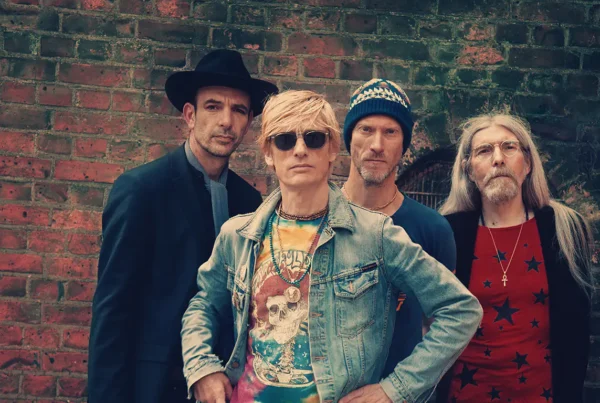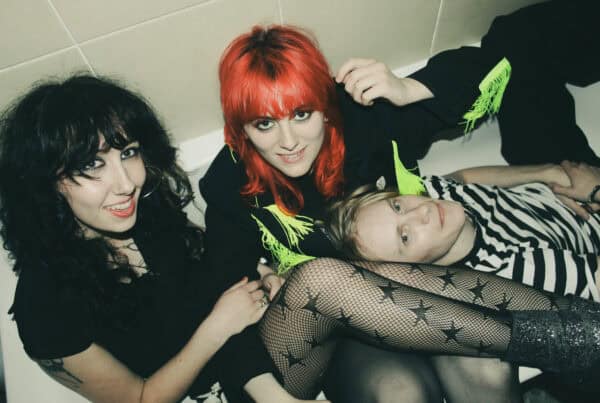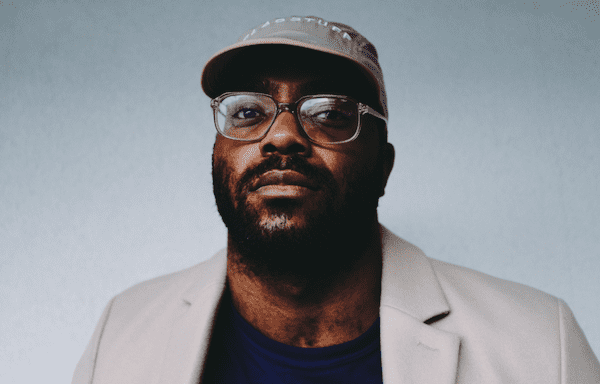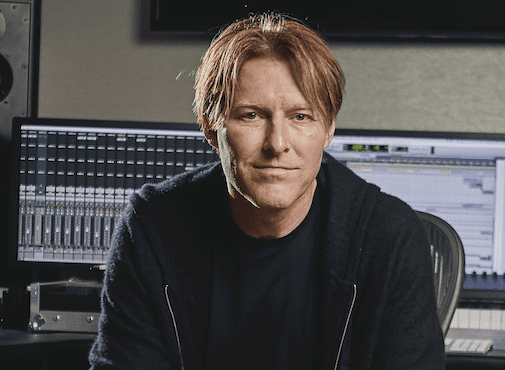Soundsphere have a chat with Mark Page, festival director of The Humber Street Sesh about how the event has grown and advice on the music industry.
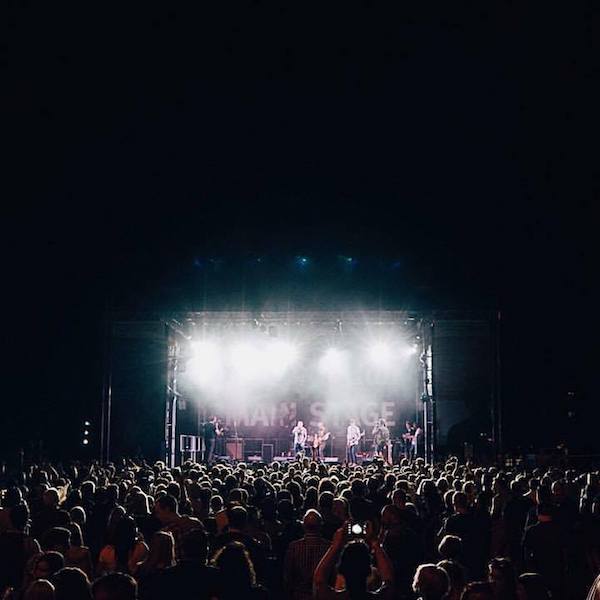
[like_to_read][/like_to_read]
S] What’s your background ?
M] My background is, I come from the English Riviera down in the South West, from a little town called Paignton next to Torquay. Music was a passion from an early age, mainly through listening to my brother and sister’s northern soul and 2 Tone collection. I quickly embraced punk and reggae, and by the early eighties got into electro and hip hop, which led to funk and then dance, with the Manchester indie bands and acid house coming through in ’88. Thereafter, I played a lot of rare groove, garage house and R&B, and by the mid-nineties I fell back in love with guitar music. I started Djing at the age of 15, went travelling abroad at 18, and through friends, I’d met abroad, got caught in the cultural fishing net of Hull in 1992.
I met my soulmate and comedy partner Deb, in the old Sydney Scarborough Record Shop in Hull around that time, and we’ve got three amazing kids who all love their music. I’m a very lucky man. Family is very important to me.
I’ve Djed all genres over the years. I’m basically a jack of all but a master of none, and that’s ok with me as that allows me to flirt with different scenes and styles. In 1995, I started a Mod Revival Night on a Tuesday, which was pretty well received and had a decent following of mods, scoooter boys, punks and indie kids. That’s when Britpop had kicked off and by 2002, after struggling with cover bands in venues playing the usual Oasis and Blur hits, I knew there was gap for a lot of kids forming original bands in the city who were struggling to find a home to play and feel wanted in. That’s when I started The Sesh.
S] How did The Sesh start?
M] The Sesh started in 2002 at The Linnet & Lark Public House in Hull. The first few weeks and months it struggled, yet a scene quickly built amongst 20 odd bands and their mates. The premise was to bring original local bands together, give them a live platform, dj their music and talk about them. We tried to be as inclusive as possible, encouraged publicity, which through quality, continuity and community, built a decent live music night. That community angle had huge benefits as a pretty vibrant and tighter creative circle grew.
S] How have you changed and developed as a person since the beginning of The Sesh to now?
M] I’m still a 15-year-old kid ‘putting records on a turntable’, and I still hate mushy peas and Meatloaf (the singer that is). The Sesh has given me the chance to surround myself with good people, and be up close to insane talent, and for that I’ll always be grateful. It’s helped me find a purpose, and given me confidence living in a strange city that I now champion and call home after 24 years.
All was fine until the festival in 2012. I soon realised I’d become totally consumed by it. I literally couldn’t breathe at times. The responsibility and demands were pretty challenging, especially when I was still Djing 5 nights a week and hosting the weekly Sesh. It’s was a pretty intense period, but one that I’ve learnt from. For 2017, I’m stepping back a little from the Djing, and embarking on a voyage of discovery by taking on the role of a fulltime Festival Director.
S] How did Humber Street Sesh come about?
M] It was to celebrate The Sesh night’s 10th Birthday. The idea was put to Dave Mays, a legendary Hullensian and a few other good friends, and t asked the question on FB to see if a ‘Sesh’ Festival was wanted and whether a crowdfunder page could be set up to finance it. 60 emerging acts across 6 stages, surrounded by street art, a silent disco down an alleyway, a street market down the street, a comedy stage and the awesome cult cinema tuned away in abandoned warehouses. Within 8 weeks a street party was held on Humber Street – known as the old fruit market quarter, next to Hull’s Marina. The street had seen Dave’s artspace venue ‘Fruit’ open a few years earlier alongside art galleries, pop up coffee shops, and a dinosaur museum !! We thought maybe a a 1000 people would come and 10,000 turned up. In 2013, with the UK city of culture bid gathering pace, we went for our second festival and increased the area. This time 40,920 showed up. Mind blown.
S] What have been some of the highlights of The Sesh for you?
M] There’s so been so many. Over a 1000+ bands and acts have played Sesh over the last fifteen years.
I’d say it’s probably The Paddingtons playing, all joyful & triumphant having achieved Top 40 success, and with queues down the street resulting in kids climbing through the windows to get in. But there’s been so many other notable gigs such as whenever Mr Beasley, Turismo, Fonda 500, The Neat (now known as Life) and the original party starter, endoflevelbaddie played. Bands such as Life, The Holy Orders, The Talks, Late Night Fiction, La Bete Blooms, Laurel Canyons have always hit the spot for me and acoustic gems like Emily Moulton, Jody McKenna, Katie Spencer and Jack Conman are mesmerising.
More recently, bands such as King No One, Vulgarians, Fronteers, Black Delta Movement, No Nothings, Dead Hormones, Cannibal Animal, Counting Coins always guarantee a great night. The list is endless to be fair. Of Allies, Three Day Millionaires, Chambers, Lumer, Black Lime, Sex Injuries, I could go on and on. From afar, I’d say Garage Punk Band Plague Vendor from California, who played to a slightly more discreet and confused crowd were easily one of the best bands I’d ever seen .They were pretty intense. Other notable gigs have been from the female fronted garage band Purple from Texas, the excellent Fatherson from Dundee, Hip Hop artist Raine Wilder from California, Polo from York, and any time the Avalanche Party boys turn up. They’re easily one of the most exciting emerging acts in the UK right now.
S] How do you feel knowing so many people are now aware of The Sesh?
M] That’s ace. Slightly scary but ace. It’s all been about providing a platform for insane talent and community. To see bands and acts grow in front of you, and achieve some form of success and recognition is so cool. I love live music, as it brings good people together. Through it, I’ve found so many awesome friends. The Sesh for years, has relied heavily upon emerging regional acts with a few invited ‘outta towners.’ We’re currently really trying to increase this and engage more with other cities and create connections. By getting some of the very best emerging acts from around the UK to play Sesh, it creates relationships and opens up opportunities for Hull’s bands and acts to network. There’s such a wealth of talent around this region, it’s insane. If Sesh, along with the likes of BBC Introducing Humberside, Warren Records, the many venues, promoters, local media, studios etc, can help try and attract more attention to Hull, then everyone will be on to a winner.
S] What are some of the challenges you face on a day-to-day basis within your job role as a festival director, but also managing The Sesh?
M] The biggest challenge is staying positive. It’s also trying to keep the music community positive as well. The responsibility of sustaining the weekly night and the festival can be pretty challenging. As with everything in this country, it can be tricky raising your head above the parapet without being shot down. Sadly there is a little bit of cynicism, apathy and even jealousy in Hull towards the Sesh/Humber Street Sesh, and with that, comes a little bit of negativity which is so draining and serves no purpose.
The highs and lows of this industry weigh heavy on my mind sometimes, and it’s important to talk about this. Over the last few years, the city has lost a few of their favourite sons who are missed hugely, and this has troubled me and others immensely. My worry is that we all give these young musicians the platform to attract short-lived adulation, which can lead to mental illness when that excitement and interest wanes offstage. I’ve had it myself with Humber Street Sesh every year, where post-event, the intensity vacuum leads to the annual black dog showing up on my doorstep. I’m learning to deal with it by talking more openly to friends and loved ones. The all-important message is not to suffer in silence, especially when silence becomes your best friend. There’s a lot to be said about who you surround yourself with. Cut out the negative voices and look for the positives in everything. (And stop drinking a dozen energy drinks to get you through the day! Rule No.1)
Another challenge is being as inclusive as possible, and we do that by giving all styles a platform. There has to be some form of quality control when booking acts, which understandably can upset those trying to get a gig. I’m sure it’s frustrating for some. This sadly leads to cries of being cliquey and exclusive on social media and that really is not the case. With so much accessible talent within reach, it’s impossible to please all, and I’ve learned quickly that not everyone will agree with your subjectivity when programming nights and events. What I will say, is that there’s been a huge increase with more live music nights and festivals than ever before in the last ten years in Hull, and therefore everyone should be able to find a stage to perform.
S] How important is it to support other promoters and venues?
M] I think it was the legendary Liverpool Football Manager Bill Shankly who said ‘If we all work together, we can share the rewards together’ and I’m a firm believer in that. The Sesh night took off because we encouraged a community of like-minded souls to engage and support one another. The same applied to Humber Street Sesh, where we gave ownership of the festival to the musicians and creatives, and we brought in a number of promoters from across the city to help support and organise various stages and elements of the festival. By doing this, we share a collective ambition to promote the city which benefits all.
S] What would you advise people who want to promote their band or get into the promotion industry? Do you believe you need to move out of Hull to become successful?
M] “If you’ve got something to say and can say it well then NO, you don’t have to move out of Hull. It’s increasingly becoming a DIY industry, and if you’re willing to commit to the cause, invest in yourself, and be available to travel then you can succeed. You can base yourself in Hull, but you have to be prepared to do the leg work. Learn your craft and build your brand with great recordings, videos, photos, merch and strong profiles on social media. Engage with producers, promoters, venues, radio, bloggers, publications etc. Get yourself to industry events and gigs. Learn and be inspired by your peers. Have the conviction to live outside your comfort zone and challenge yourself. Music has become so accessible that it’s important to find an edge, and be different to others. Offer more, believe in yourself, and grow confidence. Take ownership of your own destiny, stay positive and surround yourself with good people. See competition as a driving force to improve your offer. Hull can be a great springboard for many, if the desire, talent and commitment is there.
S] What are your plans and development for the future for The Sesh and the festival? Is there anything you are looking forward to?
M] I’m very proud of what we have achieved with The Sesh and Humber Street Sesh. We’ve captivated a city, and helped create a sense of pride within the community. Aspirations have risen, and we’ve created new jobs. To attract 30,000 to an event with emerging artists on the bill, without wheelbarrowing in the big names has been so rewarding. With 2017, where the eyes of the world could be upon Hull, as the UK City of Culture, we want to give a good account of ourselves. It’s very important we stay true to our core values, and not get too far ahead of ourselves. It’s still very much about providing a powerful platform for the creative brilliance of the region whilst engaging with industry. We aim to draw attention to these bands and acts and open doors for them. This City of Culture title is all about attracting new audiences, changing perceptions of Hull, building capacity and confidence, and creating a legacy. With Humber Street Sesh, we want to improve our offer each year, professionalise our production and keep on learning. It’s a fun, yet challenging industry, and I’m hoping Hull can rise from it’s self-effacing and sometimes apathetic persona, to become nationally known as a hotbed of emerging talent in the UK.
Interview: Dom Smith / Words: Tori Erskine

